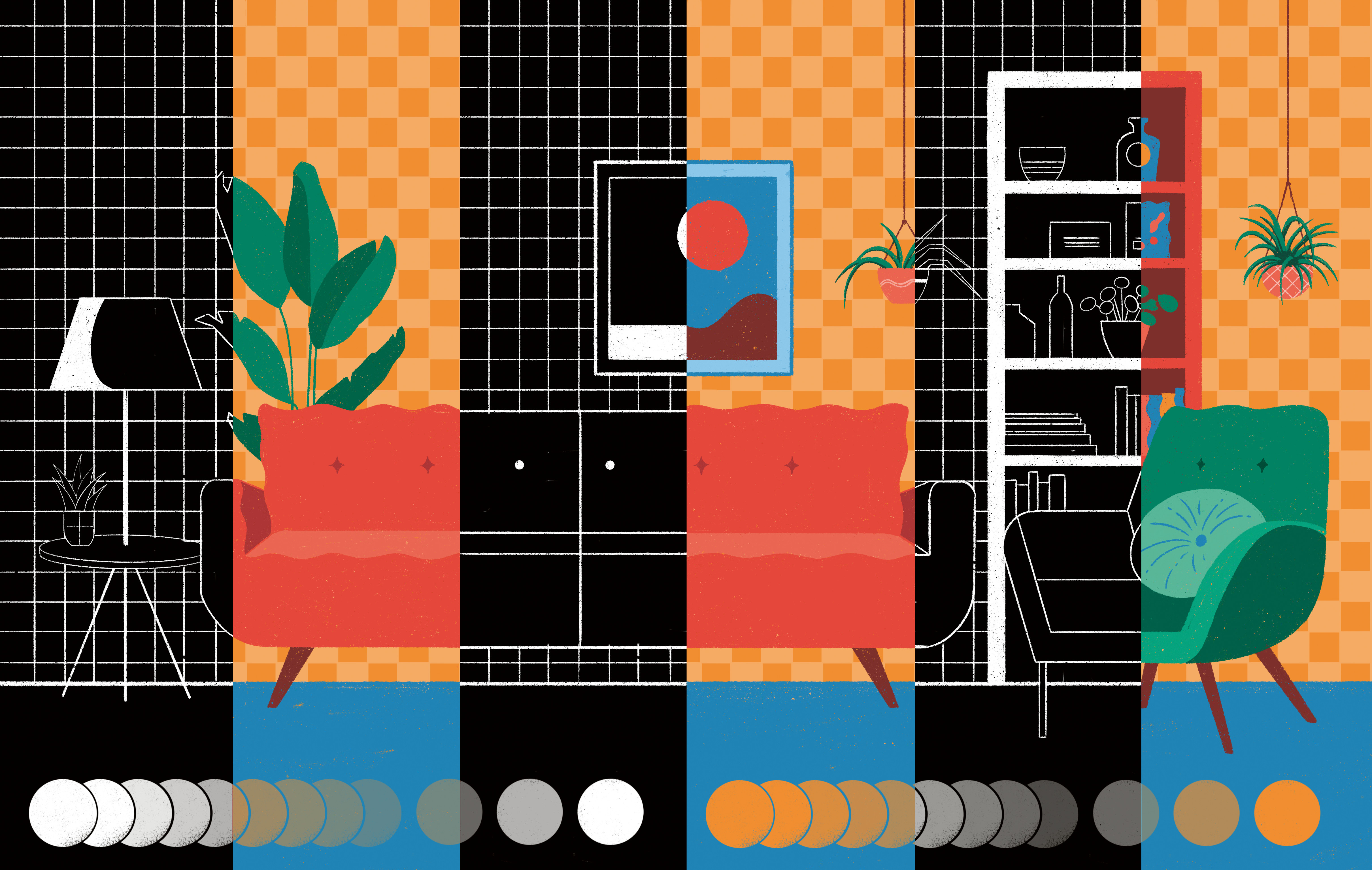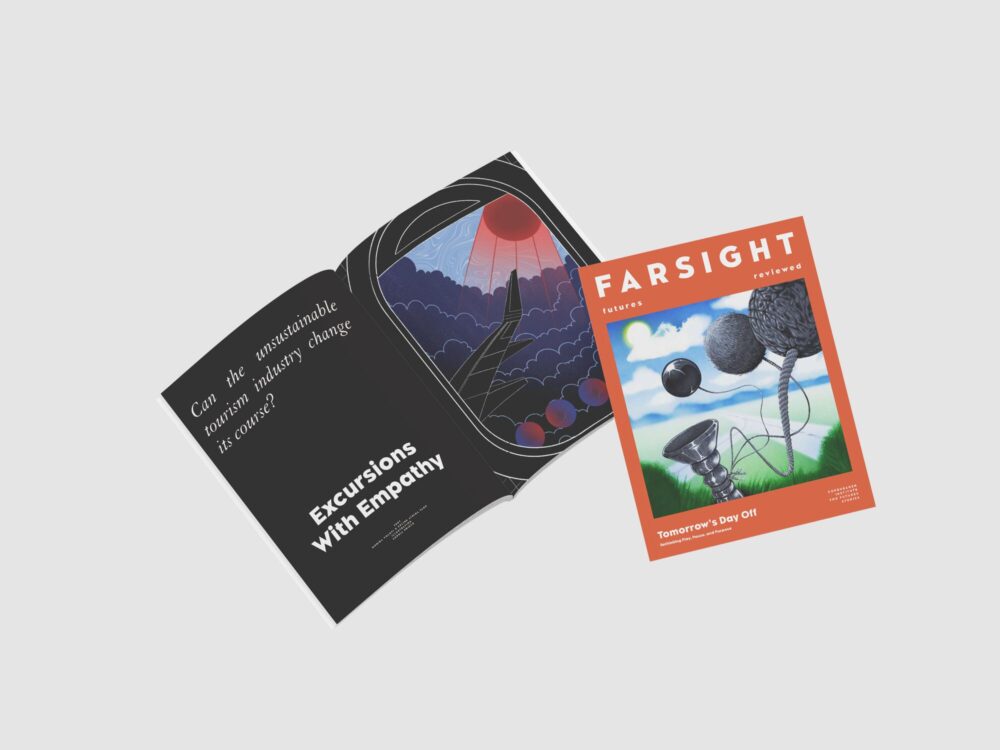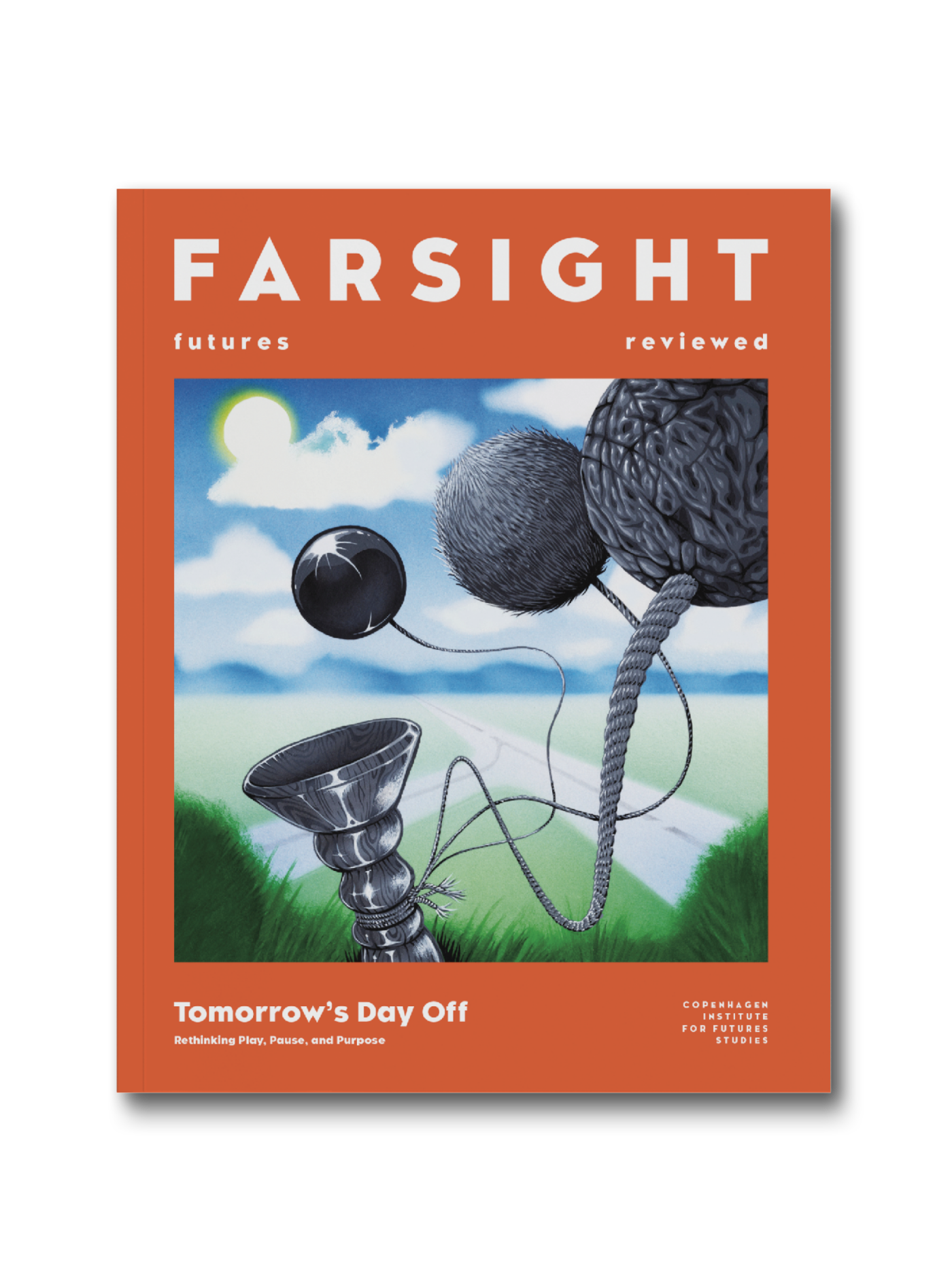
In turn, we use cookies to measure and obtain statistical data about the navigation of the users. You can configure and accept the use of the cookies, and modify your consent options, at any time.

Bored of the Future?
How philosophers and psychologists have tried to answer the question of whether to embrace or resist the mundane.
Illustration: Sophia Prieto
Boredom. It’s a feeling all of us know too well, and one that we do our best to avoid. The philosopher Arthur Schopenhauer famously called it one of the two enemies of human happiness, the other being pain. And pain, it turns out, is something many of us are willing to endure quite a bit of to escape feeling bored.
This was discovered in 2014 when a team of psychologists conducted a study involving a group of volunteer subjects, a room with a chair, a button providing an electric shock to anyone who pushed it, and a requirement of the participants to sit still with their thoughts for 15 minutes. Although most volunteers had expressed a willingness to pay money to avoid the shock, once boredom started creeping in on them, their minds began to change. Lured by the promise of momentary distraction from their idleness, two thirds of the men and a quarter of the women chose to press the button to find relief from their tedious situation.

Broaden your horizons with a Futures Membership. Stay updated on key trends and developments through receiving quarterly issues of FARSIGHT, live Futures Seminars with futurists, training, and discounts on our courses.
become a futures memberDespite the many positive benefits of solitary contemplation, boredom has long been viewed as something to be combatted. Boredom has historically been linked to social deviancy, delinquency, and crime, particularly among the youth. And its bad rep is not entirely unfounded, as studies have shown boredom to be a factor leading to all kinds of undesirable behaviour. A feature article published in Nature in 2016 titled “Why boredom is anything but boring” explains the new surge of interest in the phenomenon among scientists, pointing out that boredom has been shown to trigger binge-eating, feelings of depression and anxiety, and even drug use among adolescents who lack other recreational opportunities.
It may be a good thing, then, that the wealth of distractions on offer today means we rarely need to contend with idleness. Situations where boredom once thrived – a doctor’s waiting room, a bus ride, or a long summer with not much to do – can be made less tedious by an endless supply of distractions channelled through devices specialised in killing time. There’s always a feed to scroll, something new to read or watch, or some other way to stave off boredom.
This might be part of an explanation for why a mere 15 minutes of it has become so excruciating for many of us. The threat of boredom certainly loomed over the stone age hunter or the medieval peasant as well, but it’s doubtful that they would have found it so intolerable that they would have opted for a painful relief from it so quickly. Most likely, our pre-digital forebears were much more accustomed to idleness; our tolerance has probably declined as technological distractions have become ubiquitous.
A growing crowd of psychologists are now telling us that we shouldn’t celebrate our triumph over boredom too soon. In fact, boredom’s reputation has gone through a rehabilitation of sorts in recent years, supported by new research that supports the idea that this state of mind should not be avoided, but rather embraced and in fact sought out, at least occasionally. A bit of boredom can help spur creativity and innovation, recent studies have shown. One of them, published by the British Psychological Society in 2013, concludes that “being bored at work can make us more creative” as it gives us time to daydream and let the mind wander in interesting directions. In addition to sparking creativity, boredom, psychologists now say, should be taken as a signal that we are not at our optimal level of engagement. Whether at work or leisure, boredom is your brain trying to tell you that the environment you find yourself in is not sufficiently stimulating, or that a task or activity at hand is either too easy or too complex for you to engage with fully.
Experiencing boredom, then, is not some character flaw – not only boring people get bored – but a way for our mind to tell us something about the inadequacies of our surroundings and circumstances, whether that’s at our workplace or at home following the rhythms of daily life.

Explore the world of tomorrow with handpicked articles by signing up to our monthly newsletter.
sign up hereThere are also those who would take this thinking a step further. The philosopher and social critic Theodor Adorno went as far as to characterise boredom as a state of mind that can be attributed not just to the sometimes-unfulfilling nature of modern life, but to consumer capitalism itself, due to the totality with which this system operates. Even leisure activities or ‘hobbies’, Adorno contended, were subject to the logic of capital and thus fundamentally boring because they could never truly be autonomous or pleasurable. Modern society, his thinking went, both actively produces boredom and serves the means to combat it through constant novel streams of entertainment, technologies, and new forms of pre-packaged leisure activities. Although Adorno’s writings predate it by decades, social media – designed to arrest our attention, harvest and monetise our data, and sell products back to us – certainly fits this description. The advent of XR and the creation of true-to-life hyper-immersive worlds in the future could be thought of as its eventual culmination.
Evidently, this kind of profound and existential boredom is different from the mundane and temporary everyday kind that a scientific test subject might seek to escape via self-electrocution. To someone like Adorno, an end to the deep boredom he lamented would require that consumer capitalism loses its grip or is dismantled and replaced with something different, perhaps a post-work society characterised by a radical change in both social relations and values.
This scenario, although not unthinkable, is tough to conceive of in any kind of manageable timeframe. Yet if we suspend our disbelief and imagine a post-work and post-capitalist world of abundant leisure, what then? Would boredom cease to exist?
Such a society – perhaps coming to fruition hundreds of years into the future – would no doubt also have achieved a range of scientific and technological breakthroughs, including ones that stretch the limits of human biology. Although the idea of radical longevity currently exists on the fringes of mainstream medical science, it has long been a fixture of transhumanists and futurists, including anti-aging researchers like Aubrey de Grey, who famously proclaimed that he believes the first human to live to be 1,000 years old has already been born.
In this future, it is also likely that technological innovation would have provided us with a wealth of fresh digital distractions in the form of virtual worlds and other immersive media and entertainment to stave off mundane boredom. But would such a scenario be fulfilling and engaging enough for us to want to spend a long life in it?
The British philosopher Bernard Williams once attempted to answer this question in an essay titled “The Makropulos Case: Reflections on the Tedium of Immortality”. In Williams’ view, an ability to extend life radically by centuries would eventually lead us to choose death over the overwhelming ‘sameness’ we would begin to experience. Williams’ inquiry takes a theatre play as its starting point, in which a woman, aged 42, drinks a life-extending elixir once a year. After 300 years, she decides to quit out of boredom, and subsequently dies. This choice, to Williams, is entirely understandable. Death, we are made to understand, is what makes life interesting. At some point, we simply run out of novel experiences, impressions, and things to do.
It’s a commonly cited argument against the most radical transhumanists who see ageing as a disease to be combatted rather than a natural part of human life. In a long enough life, boredom (the profound kind) would eventually set in, probably even in a utopian, post-work and post-capitalist society of leisure and freedom. The transhumanist might encourage us to imagine the many ways in which science and technology can provide a constant stream of ‘newness’ that would keep us in a perpetual state of wonder about the world. Yet such arguments fall into the trap of confusing mundane boredom with the deeper kind, which doesn’t stem from a lack of novel experiences or impressions, but a feeling of indifferent detachment and of having seen, heard, and experienced it all before.
We can either choose to resist or embrace boredom’s pull, whatever form it takes. But until we can find answers to far-future thought experiments like these, boredom may just have to be something we will need to endure.

Read the latest issue of
FARSIGHT:
Tomorrow’s Day Off
Grab a copy here